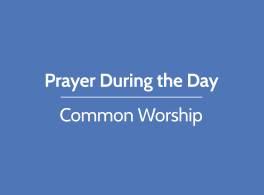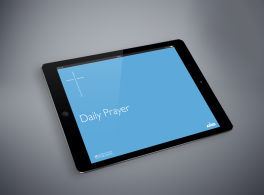The First Sunday after Trinity
The Collect
O God, the strength of all them that put their trust in thee, mercifully accept our prayers; and because through the weakness of our mortal nature we can do no good thing without thee, grant us the help of thy grace, that in keeping of thy commandments we may please thee, both in will and deed; through Jesus Christ our Lord. Amen.
The Epistle
1 St. John 4.7-end
Beloved, let us love one another: for love is of God, and every one that loveth is born of God, and knoweth God. He that loveth not knoweth not God; for God is love. In this was manifested the love of God towards us, because that God sent his only-begotten Son into the world, that we might live through him. Herein is love, not that we loved God, but that he loved us, and sent his Son to be the propitiation for our sins. Beloved, if God so loved us, we ought also to love one another. No man hath seen God at any time. If we love one another, God dwelleth in us, and his love is perfected in us. Hereby know we that we dwell in him, and he in us; because he hath given us of his Spirit. And we have seen, and do testify, that the Father sent the Son to be the Saviour of the world. Whosoever shall confess that Jesus is the Son of God, God dwelleth in him, and he in God. And we have known and believed the love that God hath to us. God is love; and he that dwelleth in love dwelleth in God, and God in him. Herein is our love made perfect, that we may have boldness in the day of judgement; because as he is, so are we in this world. There is no fear in love; but perfect love casteth out fear; because fear hath torment: he that feareth is not made perfect in love. We love him, because he first loved us. If a man say, I love God, and hateth his brother, he is a liar: for he that loveth not his brother whom he hath seen, how can he love God whom he hath not seen? And this commandment have we from him, that he who loveth God love his brother also.
The Gospel
St. Luke 16.19-end
There was a certain rich man, which was clothed in purple and fine linen, and fared sumptuously every day. And there was a certain beggar named Lazarus, which was laid at his gate full of sores, and desiring to be fed with the crumbs which fell from the rich man's table: moreover the dogs came and licked his sores. And it came to pass, that the beggar died, and was carried by the angels into Abraham's bosom. The rich man also died, and was buried: and in hell he lift up his eyes, being in torments, and seeth Abraham afar off, and Lazarus in his bosom. And he cried and said, Father Abraham, have mercy on me, and send Lazarus, that he may dip the tip of his finger in water, and cool my tongue; for I am tormented in this flame. But Abraham said, Son, remember that thou in thy life-time receivedst thy good things, and likewise Lazarus evil things; but now he is comforted, and thou art tormented. And besides all this, between us and you there is a great gulf fixed: so that they who would pass from hence to you cannot; neither can they pass to us, that would come from thence. Then he said, I pray thee therefore, father, that thou wouldest send him to my father's house: for I have five brethren; that he may testify unto them, lest they also come into this place of torment. Abraham saith unto him, They have Moses and the prophets; let them hear them. And he said, Nay, father Abraham; but if one went unto them from the dead, they will repent. And he said unto him, If they hear not Moses and the prophets, neither will they be persuaded, though one rose from the dead.
Text from The Book of Common Prayer, the rights in which are vested in the Crown,
is reproduced by permission of the Crown's Patentee, Cambridge University Press.

